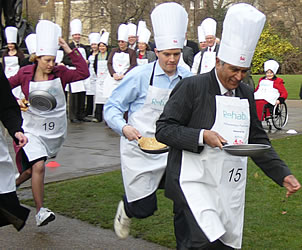Tuesday Triage #31
- TUESDAY TRIAGE #31 by Vadim Drobinin
- On croissant layers
- Things I enjoyed reading
- 1. 150 Years Ago Brooklyn Renumbered All Its Streets. It Was a Disaster by Jeremy Lechtzin
- 2. Dante: Our Medieval Contemporary by
- 3. Lizardman’s Constant Is 4% by @slatestarcodex
- 4. 57. Sound of the Sea by thebigfatundertaking
- 5. Swing primer by @ethanhein
- 6. The Other Woman by Agnes Callard
- 7. The Politics of Pancakes by Taylor Aucoin
- 8. Torching the Modern-Day Library of Alexandria by James Somers
- 9. The Rise of Lenny by @DMOberhaus
- 10. Clubhouse’s Inevitability by @benthompson
- Things I didn't know last Tuesday
- 1. Three Grand Soups
- 2. "The aquarium barter game"
- 3. Narutomaki
- 4. Pancake Races
- 5. Jubilee is the fastest Tube line in London
- 6. Pubwatch
- 7. Aboriginal Australians knew English before they met the first explorers
- 8. Chawanmushi
- 9. Ford, Alan Ford
- 10. Windows Refund Day
- Book of the week
- Thank you and see you in a week!
TUESDAY TRIAGE #31
by Vadim Drobinin ¶
Your weekly crème de la crème of the Internet is here!
16.02.2021 (read in browser)
On croissant layers ¶
I made croissants over the weekend and despite that being one of my rare attempts at baking I went for the longest recipe out there, which took around three days to finish.
Laminating dought by hand is an intensive labour, and it got me thinking about how many layers a croissant has on average.
Let's take a simple example. We mix some dough, and put a piece of butter on top of it, then fold and roll with a pin. Now we have a piece of butter trapped between two layers of dough:
========== dough
---------- butter
========== dough
This is called the French lock, and for the next step the dough gets folded in thirds:
========== dough
---------- butter
========== dough
---------- butter
========== dough
---------- butter
========== dough
One could notice, that there is an easy way to count the total number of layers in that method, which, given the Xth fold, is 3^x + 1 layers of dough and 3^x layers of butter.

However living in England literally forces me to use the English lock instead, which is a bit trickier and doubles the number of folded parts. Here is how the first fold looks like:
========== dough
---------- butter
========== dough
---------- butter
========== dough
---------- butter
========== dough
---------- butter
========== dough
---------- butter
========== dough
If we rotate (to help gluten develop in all directions) repeat everything two more times, the number of butter layers will be twice bigger than in the first method: b = 2 * 3^3 = 54 layers of butter and d = 2 * 3^3 + 1 = 55 layers of dough.
Once this sheet is rolled out into a large rectangle and cut into triangles, they get rolled up into croissants-to-be, and that where the magic happens. Each roll doubles the number of layers in the middle of the croissant, hence for Yth roll there are 2*Y times the layers: L = (b + d) * 2 * Y.
I rolled them up around four times, so L = (55 + 54) * 2 * 4 = 872 layers in total.
You can double check here:

And the result was really great for the first time:

I also did Foie Gras "Rocher" treats, using Foie Gras terrine made from scratch in a sous vide, but that's a story for another time. Maybe I will just post it on Twitter instead.


Things I enjoyed reading ¶
1. 150 Years Ago Brooklyn Renumbered All Its Streets. It Was a Disaster by Jeremy Lechtzin ¶
What could go wrong when someone decides to rename all streets in a borough? Well you never guess.
Today’s Brooklyn map is a relic of a massive 19th-century project to renumber every building and rename dozens of streets — an example of how decisions made by bureaucrats can leave an imprint on urban life for decades or even centuries.
Also bear in mind that this article is a pinnacle of interactive format, so better open on a computer.
2. Dante: Our Medieval Contemporary by ¶
A great essay on reasons for one of my favourite authors to strive despite being rather outdated in historical sense and totally up-to-date in all other senses.
The most important visual interpreters of the poem were three: Sandro Botticelli, who lived in the 16th century, William Blake, and Gustave Doré, both of whom lived in the 19th: a Florentine (like Dante himself), an Englishman, and a Frenchman.
I didn't know that the most popular translation is by William Blake, here is a good reason to read it in English too.
3. Lizardman’s Constant Is 4% by @slatestarcodex ¶
A hilarious and yet philosophical piece on poll results and reasons behind statistically not that important answers which can actually tell us a lot about the world around.
An extremely dignified sounding voice says – and this is the exact wording of the question – “Do you believe that shape-shifting reptilian people control our world by taking on human form and gaining political power to manipulate our society, or not?” Then it urges you to press 1 if yes, press 2 if no, press 3 if not sure.
4. 57. Sound of the Sea by thebigfatundertaking ¶
Just a single post from a journey onto replicating all recipes from The Fat Duck cookbook by Heston Blumenthal, which I've mentioned before.
I made the ponzu 1 month before finishing the dish. It is made from sake, fresh yuzu, fresh sudachi, mirin, rice wine vinegar, tamari soy sauce, thin mouth soy sauce, katsuo bushi and rishiri-kombu. I substituted the citrus fruits with fresh lime and store bought yuzu juice.
I could easily link to any other post from there though. They need to be read in the order they were written in to get a better understanding of the journey the author walked through.
5. Swing primer by @ethanhein ¶
One of those dances I picked up easily in the past was swing, but I always lacked the knowledge behind its magic.
Swing is complicated, but the basic idea is not. You create swing by alternately stretching and squeezing the two halves of each beat. Say you’re in 4/4 time, and you’re counting subdivided beats like so: one and two and three and four and one and two and three and four and. To swing, you stretch the onbeats (the first subdivision in each pair, the “ones,” “twos,” “threes” and “fours”), and you shorten the offbeats (the second subdivision in each pair, the “ands”.)
Well now I at least know where to look it up.
6. The Other Woman by Agnes Callard ¶
A sad essay by a yet another person brought into the abyss of despair by my least favourite Russian writer.
Whether or not Pierre is telling the truth when he says he wouldn’t even be able to recognize her anymore, I imagine she means much more to Natasha than she does to Pierre.
You may object that I am reading a lot into these few lines. That is true. I can imagine all this with some vividness, because I have occupied both positions: I have been the other woman, and I have also been other-woman-ed.
I enjoyed reading it though for it's full of undeliberate arguments against Tolstoy's prose.
7. The Politics of Pancakes by Taylor Aucoin ¶
It's the Pancakes day today, and everything seems to be calm. However, back then there was another tradition in the UK, and this is a great tour into the holiday's history:
During the 17th century, rioting became an annual Shrove Tuesday tradition, particularly in London. Crowds of craftsmen, servants and apprentices staked their age-old claims to the streets during the holiday, their targets and motives ranging from petty evictions of unwanted tenants to political plots against Parliament.
8. Torching the Modern-Day Library of Alexandria by James Somers ¶
A rather unexpected article about Google's attempts to build the modern library of all books of the world, which are being ruined by a vile government.
When the library at Alexandria burned it was said to be an “international catastrophe.” When the most significant humanities project of our time was dismantled in court, the scholars, archivists, and librarians who’d had a hand in its undoing breathed a sigh of relief, for they believed, at the time, that they had narrowly averted disaster.
9. The Rise of Lenny by @DMOberhaus ¶
An old but beautiful story about a bot which exhausts telemarketing companies by pretending to be an old man who is happy to buy everything they have to offer.
These Lenny disciples swap recordings of frustrated telemarketers and scammers who sometimes stay on the line for up to an hour trying to sell this non-existent old man everything from domain names to medical alert systems. Sometimes the telemarketers lose it when they discover Lenny is a recording, but a surprising number of the calls end with the telemarketer coming up with a polite excuse to drop the call.
Reminds me of the TV shows where people were selling things by showing how to use them and pretending to answer phone calls from other viewers.
10. Clubhouse’s Inevitability by @benthompson ¶
Pretty much everyone in all social networks I use mentions Clubhouse at least once a day... and yet I am not convinced yet.
I suspect so. For one there is the brazenness with which Clubhouse is leveraging the iPhone’s address book to build out its network; getting on the app requires an invitation, or signing up for the waiting list and hoping someone in your address book is already on the service, which lets you “jump the line”. This incentivizes both existing and prospective members to allow Clubhouse to ingest their contacts and get their friends on as quickly as possible.
Things I didn't know last Tuesday ¶
1. Three Grand Soups ¶
So I've learnt about this recently:
The Three grand soups is a common term in Japan referring to three types of soup thought to be the best in the world.
And I have two questions.
Why there are four soups?
And how come one of these soups is borscht?

2. "The aquarium barter game" ¶
Imagine you work for an aquarium and apparently are not allowed to buy new animals to avoid endangering species. What do you do? Apparently breed jellyfish.
But aquariums try to trade and barter for most of what you see on display, and it usually starts with something small. In the case of the New England Aquarium here in Boston, their basic unit of trade is the jellyfish. The New England Aquarium breeds and barters hundreds of the little guys.
3. Narutomaki ¶
I've seen this thing in ramens a lot and always thought it's some odd vegetable:

I was wrong.
Narutomaki or naruto is a type of kamaboko, or cured fish surimi produced in Japan.
What's also funny is the origin of the name:
Each cloud-shaped slice of naruto has a pink or red spiral pattern, which is meant to resemble the Naruto whirlpools in the Naruto Strait between Awaji Island and Shikoku in Japan.

4. Pancake Races ¶
I've mentioned that today is the Pancakes Day, and it had some grim history in the UK, but these days it is much better:
In the UK, pancake races form an important part of the Shrove Tuesday celebrations – an opportunity for large numbers of people, often in fancy dress, to race down streets tossing pancakes. The object of the race is to get to the finishing line first, carrying a frying pan with a cooked pancake in it and flipping the pancake as you run.

5. Jubilee is the fastest Tube line in London ¶
Someone has been tracking an average Tube speed for years:
Whether this is just the reduction in passenger numbers enabling the line to get faster to its unimpeded journey time or something more is not currently clear.
At any rate, it is clear that the slowest line of the London Underground is the Hammersmith & City, while the fastest is, at very nearly twice the speed, is the Jubilee.
I spent around two years traveling by the Hammersmith & City, so can confirm. There is definitely room for improvement.
6. Pubwatch ¶
Here in the UK police occasionaly could ban irresponsible drivers from pubs.
Given how important pubs are to the local population, I've been wondering how it works.
Apparently it is very simple.
The effectiveness of the Pubwatch initiative is mainly dependent on good communication and effective distribution of information. The preferred way of communication is by two-way radios that are available to each member. The police can be contacted directly on these radios. Individuals who are the subject of banning orders are identified by photographs that are circulated after action is taken against them.

7. Aboriginal Australians knew English before they met the first explorers ¶
Imagine traveling through half of the globe just to arrive to a previously independent continent and meet there folks who speak your language but with an accent.
Perhaps the most startling outcome of this series of events was a surreal encounter between the first group of white explorers to penetrate the deep interior of the north and an Aborigine who – they were amazed to find – already spoke a little English, picked up in the course of a voyage he’d made to Singapore.
8. Chawanmushi ¶
I had some leftover marinade from eggs we did for a ramen recently, so I was looking up what to do with it:
...literally means teacup steamed egg custard. Unlike other egg custard, Chawanmushi is not sweet but it has savoury flavour packed with umami from dashi stock and topping ingredients.
I have to add that I didn't do the savory custard in the end and opted-in for pouring the marinade out. Maybe next time.
9. Ford, Alan Ford ¶
This is like James Bond. But an Italian comics about a spy in Yugoslavia.
For those keen to know more about the former Yugoslavia, there is little as instructional as an Italian comic strip set in New York City. Relaying the adventures of a likeable but incompetent secret agent, Alan Ford enjoyed runaway success in the Yugoslavia of the 1970s and 1980s.
Wonder if there will be a proper movie? Such an opportunity.
10. Windows Refund Day ¶
Something big has happened 22 years ago.
For those who hadn't heard the story, February 15th 1999 was windows refund day. It was a worldwide day when open source OS users went to microsoft's offices to return their unused licenses of windows that they were forced to acquire since they were bundled with the machine they bought.
Wish there were more videos of that event out there. The reaction of Microsoft sellers must have been priceless.
Book of the week ¶
I've been reading Jack D. Schwager's Unknown Market Wizards, recommended by a colleague during our social hours, and so far this is quite a treat:
Dan Markey, my mentor, had an interesting philosophy about fundamentals. He thought most fundamental news was nonsense. Dan had what he called the dominant fundamental factor theory, which postulated that, over an extended period, one to five years, there was one underlying fundamental factor that was the driver of the market. All the other news merely caused gyrations around the trend driven by the dominant fundamental factor, and, more often than not, conventional wisdom didn’t have a clue about what the relevant fundamental factor was.
Given the events around stock markets in the last few weeks, this book is a yet another chance to gain a bit more motivation to think out of the box, whether it comes to trading or not.
I never was too big on putting aside money, especially if "aside" would mean ETFs or mutual bonds, and yet these are still my most successful positions over the years.
The iea of fundamentals is quite interesting on its own though. If you were to think about past years, usually there is something particularly bright for each given year, e.g wildfires in 2018, or Snowden in 2013, or the iPhone in 2007, or my birthday in 1995.
On that scale caring about day-to-day news makes less and less sense, hence reading them should not consume much time either.
I'll be back after cleaning up my RSS feed from newspapers.
Thank you and see you in a week! ¶
If you have any questions, or want to suggest a link for the next newsletter, please drop me a message on Twitter or reply to this email.
Cheers! 🍸